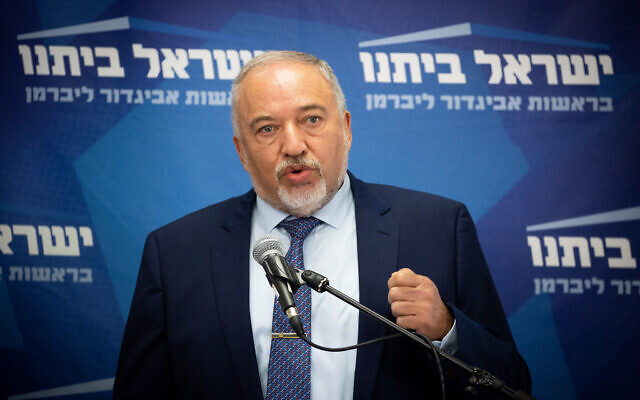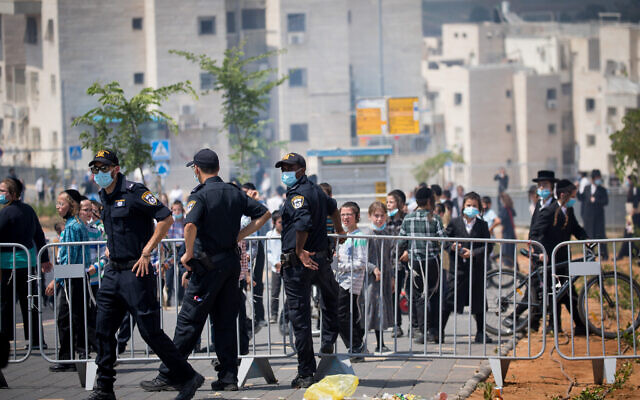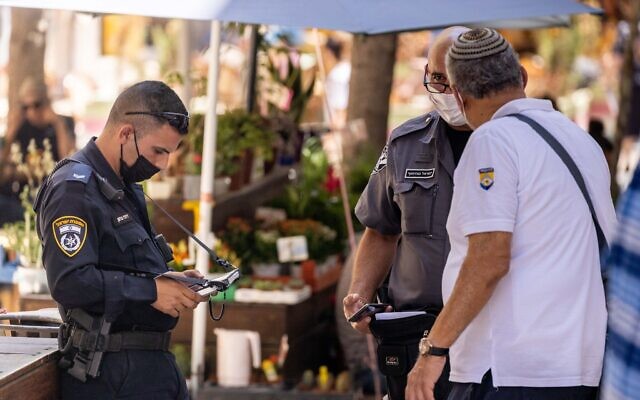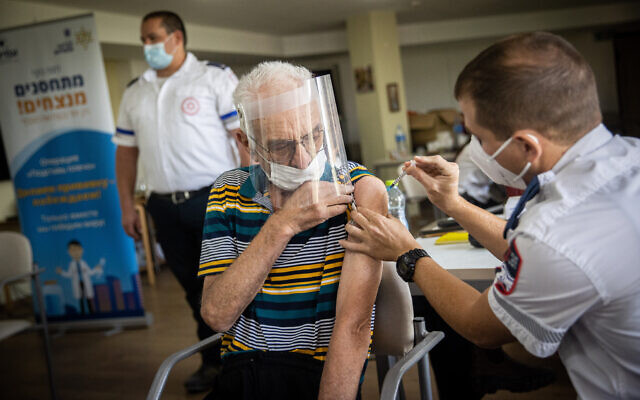Ministers finalized a plan that, despite misgivings over an 11th-hour decision to exempt places of worship, would expand restrictions on gatherings under the green pass system meant to reduce runaway coronavirus case numbers.
From Sunday, gatherings of any size will be limited to people who have been vaccinated under the Green Pass system, recovered from the virus, or who present a negative COVID test, which will extend to hotels, restaurants and gyms. Will also happen.
While the plan originally included synagogues and other houses of worship, the plan presented to ministers for a vote on Thursday night exempted prayer services with fewer than 50 participants, attracting opposition from some cabinet members.
Foreign Minister Yair Lapid and Finance Minister Avigdor Lieberman were among those who voted against the new rules in protest against religious exemptions, both of whom came under fire this week when it emerged they had given up attending coronavirus cabinet meetings.
The decision to exempt religious services stemmed from an agreement between Health Minister Nitzen Horowitz and Deputy Attorney General Raz Nijri, who raised concerns over preventing religious freedom by effectively barring the disaffected from communal prayer.
Other ministers were upset that they were not informed about the decision before the meeting. Interior Security Minister Omar Barlev, Education Minister Yifat Shasha-Bitn and Economy and Industry Minister Orna Barbiew joined Lapid and Lieberman in voting against.
Meanwhile, Lieberman reacted to criticism that he and Lapid did not participate in the high-level coronavirus cabinet, saying that Finke’s ministry was represented by Hamad Amar, who serves as a minister in the Treasury.

Finance Minister Avigdor Lieberman speaks during a faction meeting of his Israel Beytenu party in the Knesset, Jerusalem, July 26, 2021. (Yontan Sindel/Flash90)
Lieberman also said it is important that professionals make decisions on how to deal with the pandemic and get support from politicians.
The cabinet vote on Tuesday gave the final authorization by the coronavirus cabinet to expand the Green Pass system to all gatherings, not just with more than 100 people, as is the case at present.
The system will be further expanded on August 20 to include children under the age of 12, with the necessary delay to allow the health ministry to obtain a testing system.
The ministry on Thursday said it is launching a pilot project from next week to provide serological tests to children to detect those who may have the virus and have significant antibody levels.
These children will be included in the Green Pass system and will be exempted from isolation if they come into contact with a known virus carrier.
The pilot system was being tested in Elad, Bani Brak, Modin Ilit and Beit Shemesh, all largely ultra-Orthodox cities with very high numbers of COVID cases.

Example: Israeli police, under a lockdown, on a street in the Hefzibah neighborhood of Beit Shemesh, in an effort to stop the spread of the coronavirus, on July 10, 2020. (Yontan Sindel/Flash90)
Ultra-Orthodox schools also begin their school year on August 8, while most other schools begin on September 1.
The coronavirus cabinet also approved a series of restrictions on Tuesday, requiring masks outside for gatherings of 100 or more people; Office work to be increased to 50 per cent for government employees, private sector to be encouraged to allow employees to work from home; And vaccinated caregivers of infected children under the age of 12 are required to self-isolate.

Police officers enforce COVID-19 emergency regulations in Jerusalem on August 5, 2021. (Yontan Sindel / Flash 90)
The government also advocated plans to encourage Israel to stop “shaking hands, hugging, kissing, and avoiding any gathering indoors that is not necessary,” according to a government statement. It would encourage people over 60 to avoid gatherings or stay in the same room without vaccinations.
The fresh restrictions are an attempt to slow the outbreak of COVID-19, which has been blamed on the fast-spreading delta variant.
Earlier on Thursday, Prime Minister Naftali Bennett assured the public that, despite reports to the contrary, there is no shortage of COVID-19 vaccines in Israel.
“Israel has a sufficient stock of vaccines for current and future needs. There have been many shipments in recent days; This will continue,” the Prime Minister’s Office said in a statement.
The statement said the exact number of vaccines in Israel’s stockpile and future shipments could not be made public “for reasons of confidentiality”.
Speaking to Channel 12 News on Thursday evening, Dr. Sharon Alroy-Preis, the head of the Ministry of Health’s Department of Public Health, said there may be a delay of a few days in making an appointment, but supplies will not run out.

A resident of the Amigore Elder Care Facility receives the third dose of the coronavirus vaccine on August 4, 2021. (Yontan Sindel/Flash90)
Alroy-Preis also said a nationwide lockdown in September on Jewish high holidays is not inevitable.
“It’s obviously an option, but it’s in our hands,” she said. The current health regulations, he said, will not significantly reduce infection rates, but are meant to “buy time” to vaccinate people over the age of 60 with immunizations and booster shots for children and adolescents.
“Lockdown is not a strategy, it is a strategy, a move that you try to avoid unless you really have to [employ it], ” said Alro-Preis. “Right now, we don’t have to. We need to run and get vaccinated. “
According to Channel 12, a consignment of hundreds of thousands of Pfizer vaccines is expected to reach Israel on Saturday night.
The demand for a third booster dose of the COVID vaccine among people over the age of 60 has been high since the campaign officially launched on Sunday. According to the latest data from the Ministry of Health, till Thursday evening, 295,585 people had received the third dose. That’s about a fifth of adults in that age group.
As of Thursday evening, Israel had 25,467 active COVID cases, including 461 hospitalised, 262 in critical condition and 51 on ventilators. So far 32 people have died of COVID in Israel since Sunday.